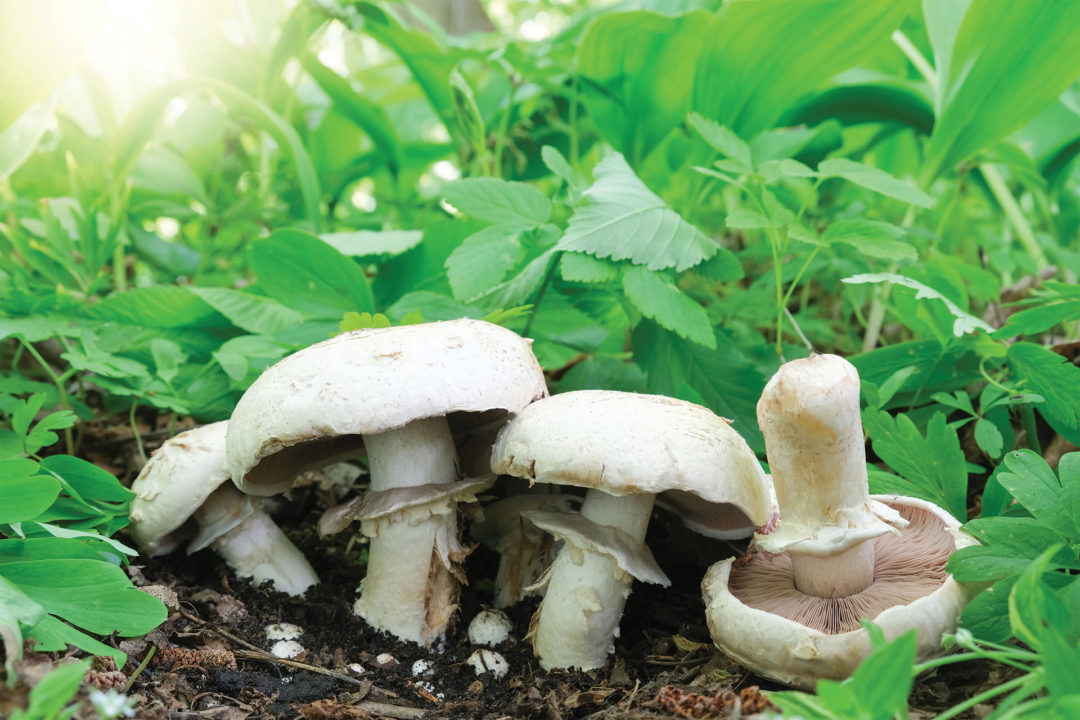In recent research led by Penn State College of Medicine, mushrooms were shown to benefit mental health. Penn State researchers used data on diet and mental health collected from more than 24,000 U.S. adults between 2005 and 2016, and found that those who ate mushrooms had lower odds of having depression. The possible connection: Mushrooms contain ergothioneine, an antioxidant. Previous studies have suggested that antioxidants help prevent several mental illnesses.
“Mushrooms are the highest dietary source of the amino acid ergothioneine—an anti-inflammatory which cannot be synthesized by humans,” said lead researcher Djibril Ba, a graduate of the epidemiology doctoral program at the College of Medicine. “Having high levels of this may lower the risk of oxidative stress, which could also reduce the symptoms of depression.”
The researchers noted that species of edible mushrooms such as Lion’s Mane may stimulate the expression of neurotrophic factors that could help prevent neuropsychiatric disorders, including depression.
In 7 Studied Benefits of Medicinal Mushrooms, writer Julia Peterman outlines a wealth of recent research on the benefits of medicinal mushrooms, including more on mood, as well as benefits for blood sugar support, cognitive health, heart health, immune support, microbiome support, and skincare.
“Traditionally, medicine is anything that helps with health,” says Mark Kaylor MH, CN, Ph.D., Consultant with Mushroom Wisdom and Founder of the non-profit Radiant Health Project, on a recent episode ofHealthQuestPodcast.com. “Medicine and food have a common origin. Mushrooms truly fit this bill.”
That’s not just hype—it’s study-proven. “There are thousands of studies on the benefits of mushrooms,” notes Dr. Kaylor. “These different mushrooms are the results of significant scientific inquiry. This fact alone tells us a great deal. The most important takeaway is that there is exciting benefit in these mushrooms to justify hundreds or thousands of studies. This gives us more confidence.”
Emerging Mushrooms to Know...
One stand-out mushroom that has been gaining in popularity in recent years: Agaricus,akathe "Brazilian Superhero." Agaricus medicinal mushroom supplement is the top-selling supplement in Japan, according to Addictive Wellness Co-founder and CEO Sage Dammers, inBenefits of Agaricus Mushroom–Brazilian Superhero.What sparked this boom? Although most Americans have never heard of Agaricus, this mushroom, which is available in capsule, powder, and gummy format, among others, has sparked interest thanks to its manyhealth benefits.As Dr. Kaylor has noted, “83% in Japan and [some in] Korea [are] using Agaricus mushrooms. Cell cultures and animal studies have been done. It has the potential to be helpful in healing. It has a 99.4%anticancereffect…In conjunction with chemotherapy, half of individuals saw their killer cells for their own bodies’ defense return to normal levels, which are typically reduced activity by chemo by 20-40%.”
Another stand-out: thechaga mushroom. Chaga capsules, derived from a mushroom found inbirch trees (1,2)are believed to have potent antioxidant and anti-inflammatory properties. As the experts FreshCap Mushrooms explain inWhy Chaga Is The "King" Of Medicinal Mushrooms, this natural gem contains a host of nutrients, including:
- B complex vitamins
- Vitamin D
- Potassium
- Selenium
- Calcium
- Magnesium
- Iron
- Zinc
Dr. Cass Ingram discussed chaga’s benefits in an episode ofHealthQuestPodcast.com, telling host Steve Lankford, “It has a history of being effective—such conditions include cardiac arrhythmia, atrial fibrillation. Boy, what a value the chaga capsules and the drops are.”
What makes chaga mushrooms so beneficial? “Chaga is rich in certain nutrients—superoxide dismutase (SOD), cadalaytes, RNAs and DNAs, rare trace minerals, melanin, and more,” explained Dr. Ingram. He added, “Chaga has the highest level ofSOD. Wild chaga is the richest known source of that important antioxidant enzyme, which protects the body tissues. It is also a dense source of beta glucan, biological sterols, vitamin D2, and the rare trace minerals rubidium, cesium, and germanium. This is what makes wild chaga an ideal whole food supplement to support a healthy aging and whole body function response.”
An important note:“First,” Dr. Kaylor instructs, “look at the actions that we know. If you’re taking immunosuppressant drugs—best to stay away from it…If you’re taking medication to lower your blood sugar, be aware that that may [lower it] even more and you may need to adjust your dose. In fact, research with blood sugar has shown that there’s a synergy between it and two of the most commonly used pharmaceuticals for lowering blood sugar to resistance, the two work really well together, so there’s just that common sense element to it.”
...and a Refresher on Familiar Favorites
WholeFoodspreviously reported inMushrooms: Superfood Superstarson more mushroom all-stars, including Maitake, Shiitake, Reishi, Cordyceps, Tremella, Poria, and other beneficial mushrooms. Check out that review for more on mushrooms, including several key factors to consider when stocking a mushroom supplement. One good question to ask: Are these products active? Read that review to learn more.WFAdditional References
- Peck CH (1893). "Report of the Botanist (1892)". Annual Report on the New York State Museum of Natural History. 46: 85–149.
- Kerrigan, RW (2005). "Agaricus subrufescens, a cultivated edible and medicinal mushroom, and its synonyms". Mycologia. 97 (1): 12–24. doi:10.3852/mycologia.97.1.12. PMID 16389952.
- Wasser, Solomon P.; Didukh, Marina Ya.; de Amazonas, Maria Angela L.; Nevo, Eviatar; Stamets, Paul; da Eira, Augusto F. (2002). "Is a Widely Cultivated Culinary-Medicinal Royal Sun Agaricus (the Himematsutake Mushroom) Indeed Agaricus blazei Murrill?". International Journal of Medicinal Mushrooms. 4 (4): 267–290. doi:10.1615/intjmedmushr.v4.i4.10. OCLC 39977461.
- Murrill, W. A. (1922). "Dark-Spored Agarics: III. Agaricus". Mycologia. 14 (4): 200–221. doi:10.2307/3753642. JSTOR 3753642.
- Chen, CHU-CHIN; Wu, Chung-MAY (1984). "Volatile Components of Mushroom (Agaricus subrufecens)". Journal of Food Science. 49 (4): 1208–1209. doi:10.1111/j.1365-2621.1984.tb10433.x.
- Smith, Alexander Hanchett (1975). A Field Guide to Western Mushrooms. Ann Arbor, Mich: University of Michigan Press. p. 228. ISBN 978-0-472-85599-5.
- Asef M.R. (2020). Field guide of Mushrooms of Iran. Tehran: Iran-Shanasi Press. p. 360. ISBN 9786008351429.
- Hirotani, M; Sai, K; Hirotani, S; Yoshikawa, T (2002). "Blazeispirols B, C, E and F, des-A-ergostane-type compounds, from the cultured mycelia of the fungus Agaricus blazei". Phytochemistry. 59 (5): 571–7. doi:10.1016/s0031-9422(01)00445-9. PMID 11853754.









